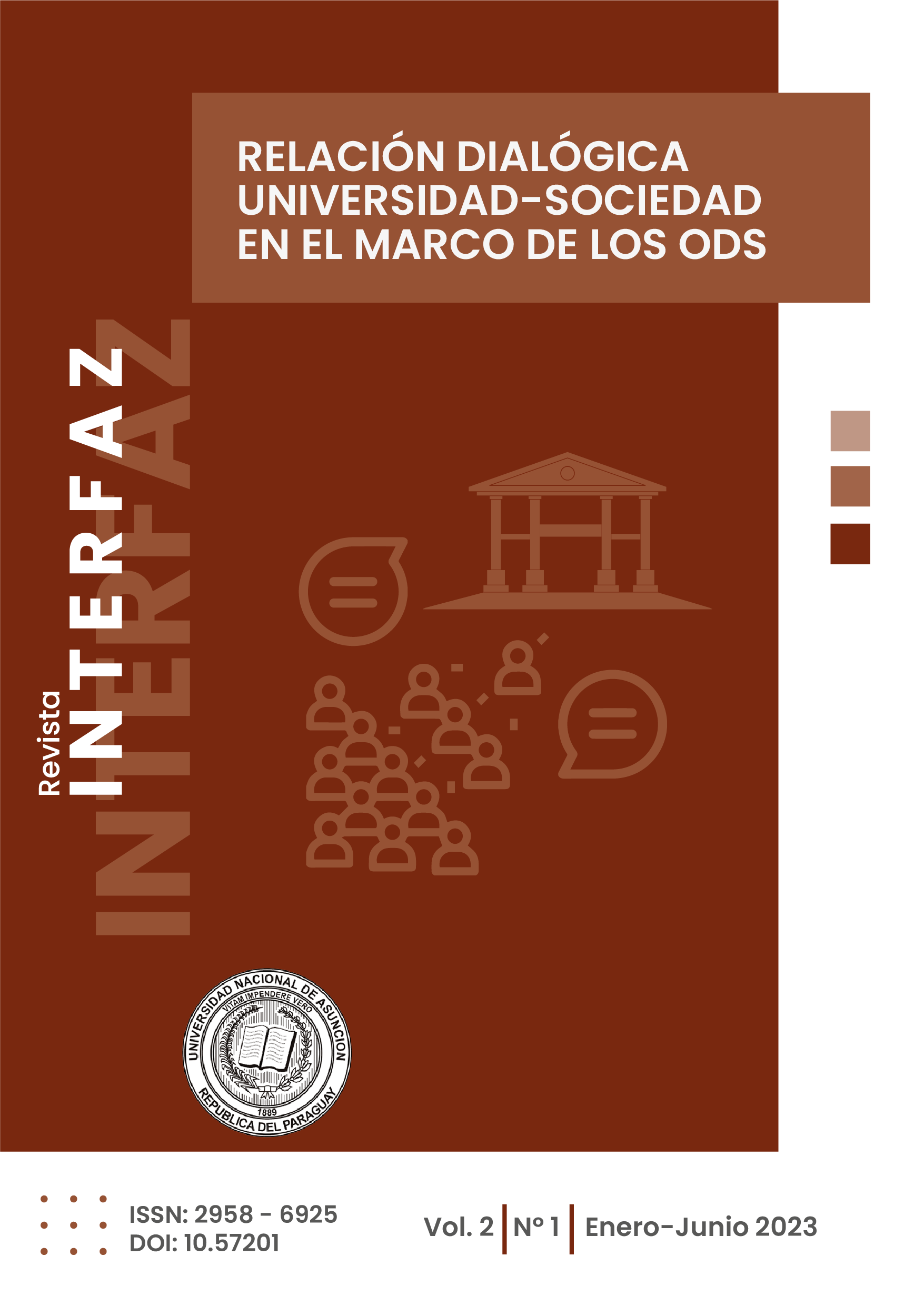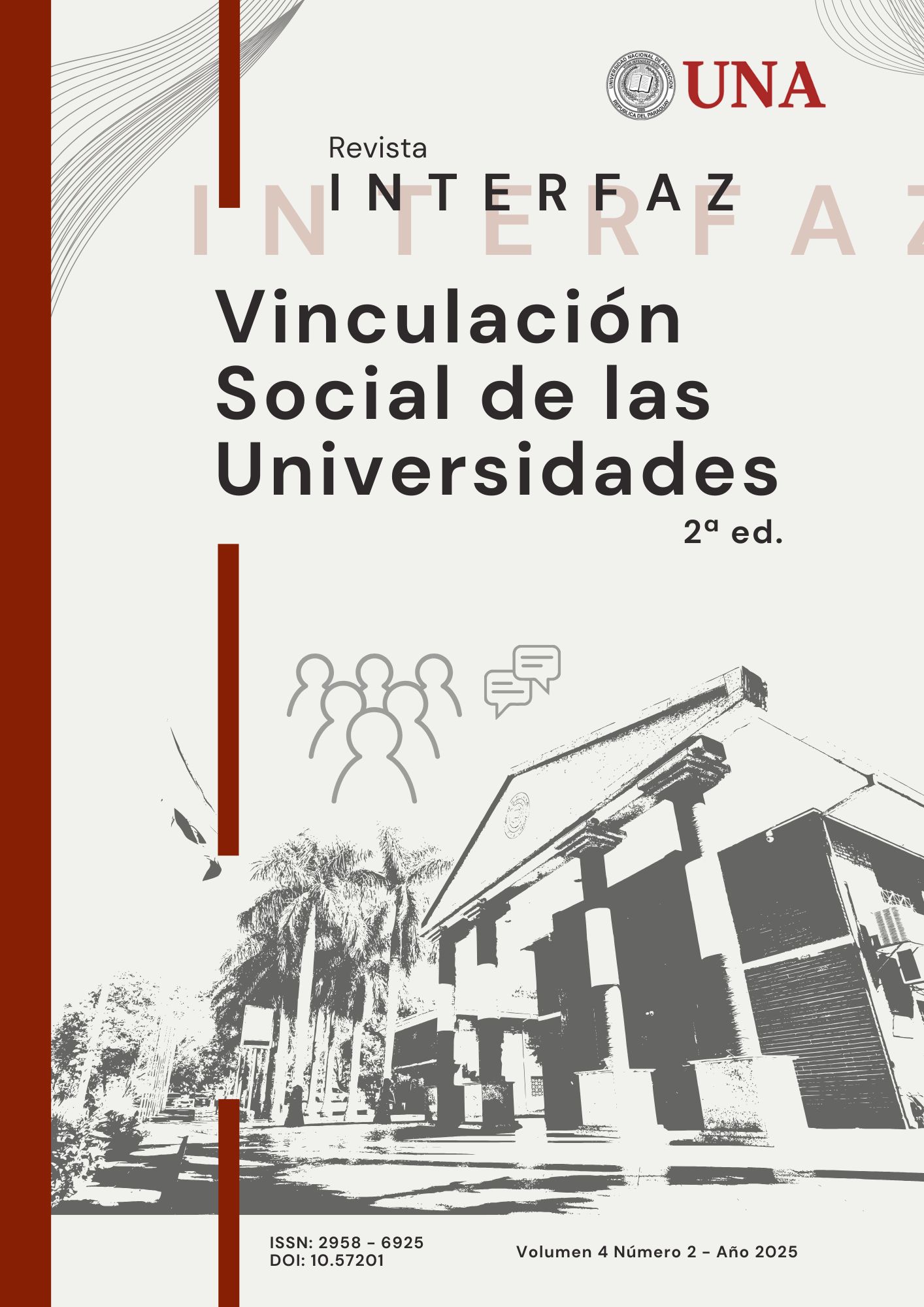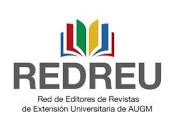Localización geográfica de ollas populares en el contexto de la pandemia por Covid-19 en Paraguay
DOI:
https://doi.org/10.57201/interfaz.2023.2.1.18Palabras clave:
ollas populares, organización comunitaria, seguridad alimentariaResumen
Las ollas populares y otras formas de solidaridad surgidas en la pandemia, organizadas por quienes han sido históricamente marginados por el Estado, constituyen una política que rescata lo local y lo colectivo; recuperando los conocimientos tradicionales. En ese sentido, el presente trabajo consiste en la presentación del resultado de sistematización de los datos recabados en el marco de un proyecto de extensión universitaria, ejecutada desde la Facultad de Ciencias Sociales FACSO-UNA, de dicha actividad participaron estudiantes de la carrera de Trabajo Social y de Sociología, a fin de contribuir en la localización y representación gráfica, en el marco de la plataforma de la Estrategia Nacional de Innovación País. Se ubicó a las ollas populares como estrategias comunitarias de enfrentamiento al Covid-19, así como la respuesta desde las políticas públicas de asistencia brindadas por el Estado. Se realizó un total de 33 entrevistas a referentes de las ollas populares correspondientes a la ciudad de Asunción, ciudades del departamento Central y algunas ciudades del interior del país. Como resultado se cuenta que un total 7565 personas se alimentaron de las ollas de los cuales 4.229 fueron niños/as y 1.140 personas adultos mayores.
Referencias
ABC Color. (10 de mayo de 2020). Ollas populares: una respuesta de solidaridad y de organización. https://www.abc.com.py/edicion-impresa/sociales/2020/05/10/ollas-populares-una-respuesta-de-solidaridad-y-de-organizacion/
Aparicio, M., Bilbao, S., Sáenz, M. M., Attias, T. (2020). Entre barbijos, Ollas Populares y Grupos de WhatsApp: Mujeres, Salud y Cuidados ante el Covid-19 en los barrios del Gran Buenos Aires, Argentina. Revista de Antropología y Arqueología, 8(1), 279-302. https://revistas.ufpel.edu.br/index.php/tessituras/article/view/1060
Colman Benítez, K. B., y Yampey Díaz, O. T. (2020). Ollas populares en el Paraguay de la pandemia COVID-19: Apuntes para una tipología. Kera Yvoty: reflexiones sobre la cuestión social, 5(número especial), 13-22. https://doi.org/10.54549/ky.5e.2020.13
Constitución de la República del Paraguay, 1992.
Galeano, A., y Schvartzman, G. (22 de abril de 2020). Hacia una revolución de los cuidados. Nodal. https://www.nodal.am/2020/04/hacia-una-revolucion-de-los-cuidados-por-ana-galeano-y-gabriela-schvartzman/
García, M. (2020). Fotoreportaje: Heroínas de la pandemia. Question/Cuestión, 2(67), e430. https://doi.org/10.24215/16696581e430
Ledesma Posteguillo, C, Martinetti Almirón, N. (2020). El desarrollo humano y las oportunidades en tiempos del Covid-19. Ciudad de Coronel Oviedo, Paraguay. Academia Disclosure, 1(1), 297-306. https://revistascientificas.una.py/index.php/rfenob/article/view/82/82
Pereira, H., Genes, V., Pereira Molinas, A. (2022). Construcción colectiva de saberes desde la extensión universitaria. Revista INTERFAZ, 1(1), 3-18. https://orcid.org/0000-0002-9834-0737
Universidad Nacional de Asunción, UNA. (2017). Estatuto de la Universidad Nacional de Asunción. UNA.
Programa de las Naciones Unidas para el Desarrollo, PNUD. (2020). Plataforma Wendà de la Estrategia Nacional de Innovación. https://innovacion.gov.py/wenda/
Descargas
Publicado
Número
Sección
Licencia
Derechos de autor 2023 Mirian Mabel Rodriguez Ramirez

Esta obra está bajo una licencia internacional Creative Commons Atribución 4.0.











